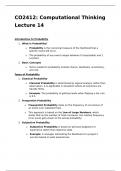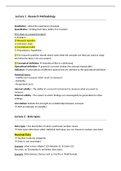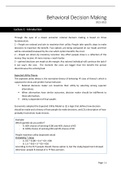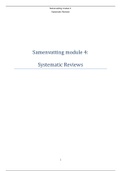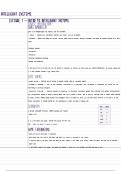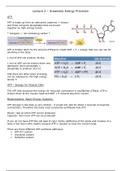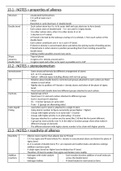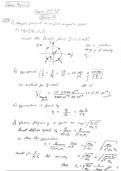Learning area 3
Deductions
Taxable income = amount remaining after deducting all allowable deductions and
allowances from the ‘income’ as determined.
most deductions are allowed by virtue of the so-called general deduction formula in s
11(a) read with s 23(g), unless specifically provided for elsewhere in the Act, expenditure
and losses incurred in the carrying on of a trade may only be deductible if the requirements
(positive terms) are complied with, furthermore, the provisions of s 23 must also be
complied with.
- Provisions of s 23 contain the prohibited deductions (negative terms) stating what is
NOT deductible
GENERAL DEDUCTIONS:
11. General deductions allowed in determination of taxable income.—For the purpose of
determining the taxable income (during the year of assessment) derived by any person from
carrying on any trade, there shall be allowed as deductions from the income of such person
so derived –
(a) expenditure and losses actually incurred in the production of the income, provided such
expenditure and losses are not of a capital nature;
23. Deductions not allowed in determination of taxable income.—No deductions shall in
any case be made in respect of the following matters, namely—
(g) any moneys, claimed as a deduction from income derived from trade, to the extent to
which such moneys were not laid out or expended for the purposes of trade;
- first step in the enquiry as to whether an expenditure or loss is deductible in terms of the
general deduction formula, is to establish whether the taxpayer was carrying on a trade
, VERY IMPORTANT
The General Deduction Formula:
For an expense to be deducted, the following elements must be met:
1. Carrying on a trade
2. Expenditure and losses
3. Actually incurred
4. During the year of assessment
5. In the production of income
6. Not of a capital nature
7. Laid out or expended for the purposes of trade (s23g)
,Carrying on a Trade:
- Definition of ‘trade’: Section 1 of the Act:
“every profession, trade, business, employment, calling, occupation or venture,
including the letting of any property and use of OR the grant of permission to use
any patent... design... trademark... copyright... or any other property which is of a
similar nature”
o Only deductible if person is carrying on a trade, the implications are
- Expenditure incurred prior to the commencement of that trade is not deductible in
terms of s 11
- Expenditure not incurred in carrying on a trade is not deductible in terms of s 11
- Expenditure can only be deducted from the income derived from carrying on a trade,
this is strengthened by s 23(g) ; however, if a section specifies that a deduction can
be claimed despite s 23(g), for e,g, s 11F, a deduction can be claimed against non-
trade income
o Burgess v CIR (1993): the principle that this definition should be given a wide
interpretation was described as being well established, it was further held that the
taxpayer, who laid out money to obtain a bank guarantee, which he risked in the
hope of making a profit, was engaged in a ‘venture’, a speculative enterprise par
excellence
o Grosskopf JA said that a taxpayer carrying on what, standing on its own, amounts to
the carrying on of a trade does not cease to carry on a trade simply because one of
his purposes or even his main purpose is to enjoy a tax advantage. “If he carries on a
trade, his motive is irrelevant”
o ‘Carrying on of a trade’ might imply there must be a continuity of activities,
however, Stephan v CIR ; a single venture was held to be the ‘carrying on of a
business’
o Continuity and profit motive are not prerequisites for the carrying on of a trade –
activities concerned should be examined as a whole to establish whether in fact the
taxpayer is carrying on a trade
o Trade doesn’t include all activities that produce income; income in the form of
interest, dividends, annuities, or pensions (passive investment income)
o A person who accumulates his savings and invests them in interest-bearing securities
or shares held as assets of a capital nature does not derive the income from carrying
on any trade, in practice, SARS accepts that if capital is borrowed specifically to
reinvest, such a transaction results in trade income and the expenditure is thus,
allowable
on this basis, it will allow interest incurred to earn interest income as a deduction
o More than one trade taxpayer was a manufacturer, wholesaler and retailer of
stationery operating throughout the country ; he becomes insolvent, placed in
provisional liquidation. Liquidators sold his business with the exclusion of goods and
stock in bond, whilst in liquidation, 2 sale transactions i.e., the sale of goods in bond
, and stock on bond respectively were undertaken by the liquidators ; the court held
that transactions concluded by the liquidators involving the realization of the
taxpayers stock during liquidation do not constitute the carrying on of a trade by the
taxpayer himself
Pre-trade expenditure (s11A)
Expenditure and losses are generally only deductible if incurred after the
commencement of a trade ; in the process of starting and setting up a trade,
taxpayer incurs various expenditure in preparation for the carrying on of that trade
before trading starts – usually assets bought, rent paid, salaries paid – regarded as
capital expenditure because they relate to the setting up of an income-producing
structure
Section 11A allows certain qualifying expenditure and losses, incurred before the
commencement of that trade, as a deduction, once that specific trade is carried on
(subject to the limitation provisions of s 23H)
Only 11A to 11W excluding 11X
E.g. s 11D; research and development costs or s 24J; interest incurred can be
deducted as a pre-trade expenditure
Expenditure and losses:
- CSARS v Labat (2011 SCA)
- SCA: held that terms liability, obligation and expenditure are NOT synonyms, the
action of spending, disbursement, or consumption, hence the amount of money
spent
- Would also include the disbursement of other assets with monetary value
- Loss – Joffe & Co v CIR – held that the word had several meanings
- Loss: in relation to trading operations, the word is used to signify a deprivation
suffered by the loser, involuntary deprivation, whereas expenditure means a
voluntary payment of money
Actually incurred:
‘actually incurred’ rather than the words ‘necessarily incurred’ widens the field of
deductible expenditure
e.g. one man may conduct his business inefficiently/extravagantly, incurring
expenditure that another man does not incur, such expenditure is therefore not
‘necessary’, but it is actually incurred, and is thus deductible
‘expenditure actually incurred’ does not mean expenditure actually paid out during
the year of assessment, it was said to mean ‘all expenditure for which a liability has
been incurred during the year, whether the liability has been discharged during that
year or not – actual payment is therefore not essential for the deduction for the
deduction of expenditure
Meaning of ‘incurred’ in Edgars Stores Ltd v CIR it is clear that only expenditure
(otherwise qualifying for deduction) in respect of which the taxpayer has incurred an
unconditional legal obligation during the year of assessment in question may be
deducted in terms of s11(a) from income returned for that year – if the obligation is
initially incurred as a conditional one during a particular year of assessment and is
Deductions
Taxable income = amount remaining after deducting all allowable deductions and
allowances from the ‘income’ as determined.
most deductions are allowed by virtue of the so-called general deduction formula in s
11(a) read with s 23(g), unless specifically provided for elsewhere in the Act, expenditure
and losses incurred in the carrying on of a trade may only be deductible if the requirements
(positive terms) are complied with, furthermore, the provisions of s 23 must also be
complied with.
- Provisions of s 23 contain the prohibited deductions (negative terms) stating what is
NOT deductible
GENERAL DEDUCTIONS:
11. General deductions allowed in determination of taxable income.—For the purpose of
determining the taxable income (during the year of assessment) derived by any person from
carrying on any trade, there shall be allowed as deductions from the income of such person
so derived –
(a) expenditure and losses actually incurred in the production of the income, provided such
expenditure and losses are not of a capital nature;
23. Deductions not allowed in determination of taxable income.—No deductions shall in
any case be made in respect of the following matters, namely—
(g) any moneys, claimed as a deduction from income derived from trade, to the extent to
which such moneys were not laid out or expended for the purposes of trade;
- first step in the enquiry as to whether an expenditure or loss is deductible in terms of the
general deduction formula, is to establish whether the taxpayer was carrying on a trade
, VERY IMPORTANT
The General Deduction Formula:
For an expense to be deducted, the following elements must be met:
1. Carrying on a trade
2. Expenditure and losses
3. Actually incurred
4. During the year of assessment
5. In the production of income
6. Not of a capital nature
7. Laid out or expended for the purposes of trade (s23g)
,Carrying on a Trade:
- Definition of ‘trade’: Section 1 of the Act:
“every profession, trade, business, employment, calling, occupation or venture,
including the letting of any property and use of OR the grant of permission to use
any patent... design... trademark... copyright... or any other property which is of a
similar nature”
o Only deductible if person is carrying on a trade, the implications are
- Expenditure incurred prior to the commencement of that trade is not deductible in
terms of s 11
- Expenditure not incurred in carrying on a trade is not deductible in terms of s 11
- Expenditure can only be deducted from the income derived from carrying on a trade,
this is strengthened by s 23(g) ; however, if a section specifies that a deduction can
be claimed despite s 23(g), for e,g, s 11F, a deduction can be claimed against non-
trade income
o Burgess v CIR (1993): the principle that this definition should be given a wide
interpretation was described as being well established, it was further held that the
taxpayer, who laid out money to obtain a bank guarantee, which he risked in the
hope of making a profit, was engaged in a ‘venture’, a speculative enterprise par
excellence
o Grosskopf JA said that a taxpayer carrying on what, standing on its own, amounts to
the carrying on of a trade does not cease to carry on a trade simply because one of
his purposes or even his main purpose is to enjoy a tax advantage. “If he carries on a
trade, his motive is irrelevant”
o ‘Carrying on of a trade’ might imply there must be a continuity of activities,
however, Stephan v CIR ; a single venture was held to be the ‘carrying on of a
business’
o Continuity and profit motive are not prerequisites for the carrying on of a trade –
activities concerned should be examined as a whole to establish whether in fact the
taxpayer is carrying on a trade
o Trade doesn’t include all activities that produce income; income in the form of
interest, dividends, annuities, or pensions (passive investment income)
o A person who accumulates his savings and invests them in interest-bearing securities
or shares held as assets of a capital nature does not derive the income from carrying
on any trade, in practice, SARS accepts that if capital is borrowed specifically to
reinvest, such a transaction results in trade income and the expenditure is thus,
allowable
on this basis, it will allow interest incurred to earn interest income as a deduction
o More than one trade taxpayer was a manufacturer, wholesaler and retailer of
stationery operating throughout the country ; he becomes insolvent, placed in
provisional liquidation. Liquidators sold his business with the exclusion of goods and
stock in bond, whilst in liquidation, 2 sale transactions i.e., the sale of goods in bond
, and stock on bond respectively were undertaken by the liquidators ; the court held
that transactions concluded by the liquidators involving the realization of the
taxpayers stock during liquidation do not constitute the carrying on of a trade by the
taxpayer himself
Pre-trade expenditure (s11A)
Expenditure and losses are generally only deductible if incurred after the
commencement of a trade ; in the process of starting and setting up a trade,
taxpayer incurs various expenditure in preparation for the carrying on of that trade
before trading starts – usually assets bought, rent paid, salaries paid – regarded as
capital expenditure because they relate to the setting up of an income-producing
structure
Section 11A allows certain qualifying expenditure and losses, incurred before the
commencement of that trade, as a deduction, once that specific trade is carried on
(subject to the limitation provisions of s 23H)
Only 11A to 11W excluding 11X
E.g. s 11D; research and development costs or s 24J; interest incurred can be
deducted as a pre-trade expenditure
Expenditure and losses:
- CSARS v Labat (2011 SCA)
- SCA: held that terms liability, obligation and expenditure are NOT synonyms, the
action of spending, disbursement, or consumption, hence the amount of money
spent
- Would also include the disbursement of other assets with monetary value
- Loss – Joffe & Co v CIR – held that the word had several meanings
- Loss: in relation to trading operations, the word is used to signify a deprivation
suffered by the loser, involuntary deprivation, whereas expenditure means a
voluntary payment of money
Actually incurred:
‘actually incurred’ rather than the words ‘necessarily incurred’ widens the field of
deductible expenditure
e.g. one man may conduct his business inefficiently/extravagantly, incurring
expenditure that another man does not incur, such expenditure is therefore not
‘necessary’, but it is actually incurred, and is thus deductible
‘expenditure actually incurred’ does not mean expenditure actually paid out during
the year of assessment, it was said to mean ‘all expenditure for which a liability has
been incurred during the year, whether the liability has been discharged during that
year or not – actual payment is therefore not essential for the deduction for the
deduction of expenditure
Meaning of ‘incurred’ in Edgars Stores Ltd v CIR it is clear that only expenditure
(otherwise qualifying for deduction) in respect of which the taxpayer has incurred an
unconditional legal obligation during the year of assessment in question may be
deducted in terms of s11(a) from income returned for that year – if the obligation is
initially incurred as a conditional one during a particular year of assessment and is

